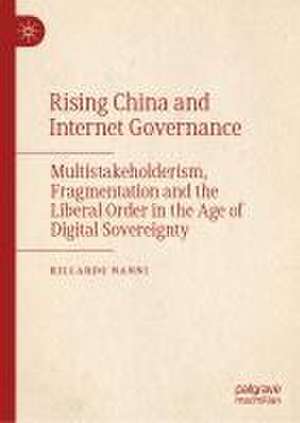Rising China and Internet Governance: Multistakeholderism, Fragmentation and the Liberal Order in the Age of Digital Sovereignty
Autor Riccardo Nannien Limba Engleză Hardback – 27 apr 2024
Preț: 726.85 lei
Preț vechi: 886.41 lei
-18% Nou
Puncte Express: 1090
Preț estimativ în valută:
139.08€ • 151.55$ • 117.20£
139.08€ • 151.55$ • 117.20£
Carte tipărită la comandă
Livrare economică 23 aprilie-07 mai
Preluare comenzi: 021 569.72.76
Specificații
ISBN-13: 9789819703562
ISBN-10: 9819703565
Ilustrații: XXI, 205 p. 2 illus.
Dimensiuni: 148 x 210 mm
Greutate: 0.42 kg
Ediția:2024
Editura: Springer Nature Singapore
Colecția Palgrave Macmillan
Locul publicării:Singapore, Singapore
ISBN-10: 9819703565
Ilustrații: XXI, 205 p. 2 illus.
Dimensiuni: 148 x 210 mm
Greutate: 0.42 kg
Ediția:2024
Editura: Springer Nature Singapore
Colecția Palgrave Macmillan
Locul publicării:Singapore, Singapore
Cuprins
1. Introduction.- 2. China, Internet Governance, and the Liberal International Order.- 3. Situating Chinese engagement in Internet governance: China’s domestic digital policy reviewed.- 4. On the Normative Impact of Chinese Stakeholders in the Governance of Critical Internet Resources. A Document- and Interview-based Analysis.- 5. On the Normative Impact of Chinese Stakeholders in Mobile Internet Standard-making. A Document- and Interview-based Analysis.- 6. The Rise of China, Internet Fragmentation, and the Future of Multistakeholderism: Implications for the Liberal International Order.- 7. Conclusion.
Notă biografică
Riccardo Nanni is Researcher in Data Governance at Fondazione Bruno Kessler's Digital Commons Lab. He obtained a Ph.D. in International Relations (June 2022) from the Department of Political and Social Sciences of the University of Bologna (Italy). His Ph.D. thesis discussed the influence of Chinese public and private stakeholders in Internet governance, particularly the making and distribution of Internet and mobile connectivity standards.
Textul de pe ultima copertă
This book provides an account of the transformation of Chinese stakeholders' engagement in Internet governance, from normative contestation to integration, and from isolation to an industrial leadership role. The book concludes that Chinese stakeholders are not seeking to fragment the Internet but are rather integrating in the existing global Internet governance mechanisms while adopting strong regulation domestically. This counters a widespread media (and academic) narrative on China as the promoter of an alternative Internet and/or an alternative model of Internet governance. These conclusions are reached through a mix of qualitative methods, including interviews with people involved first-hand in Internet governance, such as technologists engaged in the making of Internet and mobile connectivity standards.
Riccardo Nanni is Researcher in Data Governance at Fondazione Bruno Kessler's Digital Commons Lab. He obtained a Ph.D. in International Relations (June 2022) from the Department of Political and Social Sciences of the University of Bologna (Italy). His Ph.D. thesis discussed the influence of Chinese public and private stakeholders in Internet governance, particularly the making and distribution of Internet and mobile connectivity standards.
Caracteristici
Explores transformation of Chinese stakeholders' engagement in Internet governance Includes interviews with people involved first-hand in Internet governance in China Challenges the narrative on China as the promoter of an alternative Internet and/or an alternative model of governance
